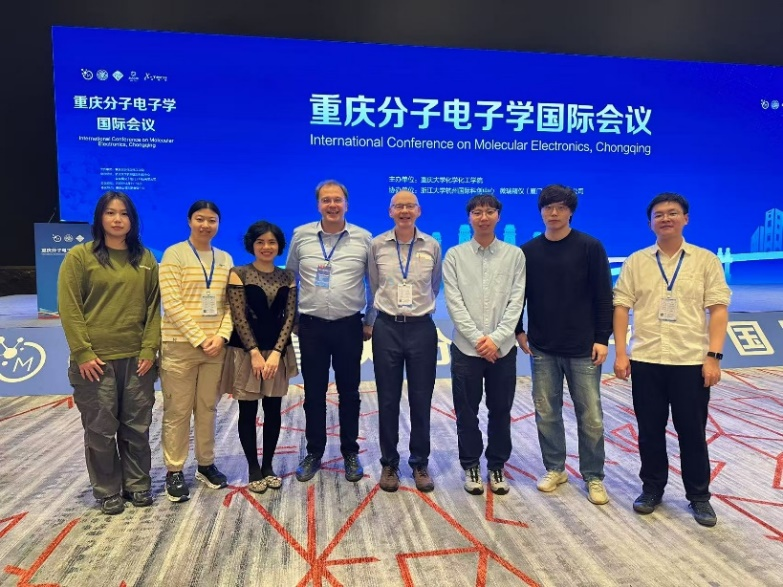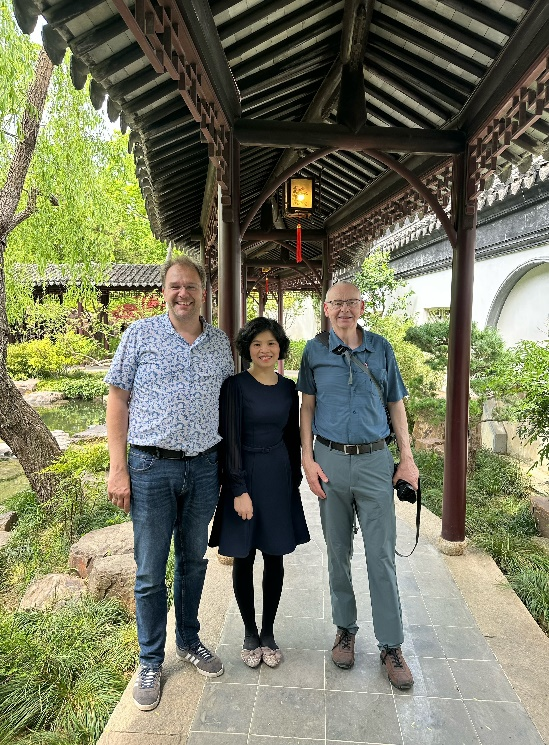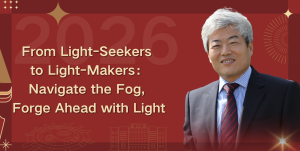07 May 2025
Bridging Theory and Experimental Practice: Prof. Li Yang’s, China Collaborations with Prof. Richard Nichols, UK and Dr. Yannick Dappe, France
For over a decade, Prof. Li Yang from XJTLU's School of Science, China has cultivated two extraordinary highly productive international collaborations that have redefined research in molecular electronics. These research collaborations with Prof. Richard Nichols (University of Liverpool, UK) and Dr. Yannick Dappe (CNRS, University Paris Saclay, France) represent the perfect synergy of theoretical insights and experimental studies, yielding pioneering discoveries that continue to shape the field of molecular electronics and nanotechnology.
In this collaboration, Prof. Li, Prof. Nichols and Dr. Dappe pioneered transformative advances in molecular electronics by introducing graphene electrodes into scanning tunnelling microscopy (STM) molecular junctions. This was a bold concept at the time, demonstrating that hybrid gold-graphene junctions conduct more current over longer molecular chains than traditional gold-gold configurations. This breakthrough, published in Nano Letters, revealed how graphene interfaces reduce electronic attenuation, opening new design principles for nanoscale devices. The team also developed an electrochemical STM measurement technique, enabling unprecedented insights into charge transport through redox-active molecules and graphene contacts. Their combined theoretical and experimental innovations reshaped our understanding of conductance in asymmetrical molecular junctions.

Figure 1(a) Schematic illustration of a hybrid gold-molecule-graphene molecular junction; (b) Artistic representation of a full carbon molecular junction; (c) Study of dual switching functionality of azobenzene-based molecular monolayers, with light or protonation actuation.
This tri-parte international collaboration has led to 13 high-impact joint publications in leading journals such as Nano Letters, Journal of Physical Chemistry Letters, Nanoscale, and ACS Applied Nano Materials etc., demonstrating the synergy between theory and experiment. Additionally, the partnership has facilitated joint PhD supervisions, with Dr. Dappe’s annual visits to XJTLU (including his honorary lectureship from 2019–2022; 2024-2027) and regular academic exchanges between Liverpool, UK and Suzhou, China strengthening research and training. By integrating computational modelling, cutting-edge experiments, and innovative measurement techniques, this collaboration continues to push the boundaries of discovery in molecular electronics.
Notable PhD Alumni
This extraordinary collaboration has also nurtured exceptional researchers holding prominent positions in academia and industry.
Dr. Qian Zhang (PhD, University of Liverpool, 2019), supervised by Prof. Li Yang and Prof. Richard Nichols, is currently an Associate Professor at Chongqing University, recognised as a high-level talent in Chongqing. After his postdoctoral work at the National University of Singapore, he established an independent research group focused on functional organic molecular devices and electrochemical enhancement. Dr. Zhang has 30+ SCI publications in top journals (Nature Materials, Nature Communications, Nano Letters), and received several prestigious awards such as the 2024 Young Scientist grant from the National Science Foundation of China, the Chongqing Chemical Society Scientific Progress First Prize and the China Circular Economy Association Technical Invention Second Prize.
Dr. Shuhui Tao (PhD, University of Liverpool, 2021) is a Research Fellow at the National University of Singapore, Chongqing Research Institute. Dr. Tao specialises in chemical-gating molecular devices, flexible electronics, and 2D materials. She has also contributed to 30+ SCI publications, advancing innovations in molecular nanotechnology.
These alumni exemplify the global impact of this three-way international collaborative research training.
A Memorable Reunion and Future Horizons
A defining moment in this scientific journey came when all three researchers met jointly for the first time at an international molecular electronics conference in Chongqing, China. This gathering symbolised their shared vision for advancing molecular electronics and nanotechnology, strengthening their determination to push boundaries together. With pandemic restrictions lifted and support from an abundance of top quality and highly talented students from a new MRes in Materials Science and Engineering programme running for the last three years and a BEng in Materials Science and Engineering programme to be launched in September 2025 within the Department of Chemistry and Materials Science, School of Science at XJTLU, the team is embarking on an exciting new chapter. Current projects explore electrochemistry-STM for molecular transistors, quantum interference phenomena, and large-area self-assembled monolayers. Plans for bright student recruitment and exchanges and institutional partnerships promise to deepen these collaborations further. As they approach 20+ joint publications and prepare to graduate more Undergraduate, Masters and especially PhD students, the potential for transformative discoveries has never been greater and it is expected to make a global impact.

Figure 2: (from third left) Prof. Li Yang, Dr. Yannick Dappe, Prof. Richard Nichols and Prof Li. Yang’s research group attending the international conference on molecular electronics, Chongqing

Figure 3: (from third left) Dr. Yannick Dappe, Prof. Li Yang and Prof. Richard Nichols visiting Suzhou Keyuan garden
Join us in celebrating these remarkable achievements and stay tuned for the future!
Students interested in our outstanding and highly competitive School of Science related programmes should contact the following:
· BEng in Materials Science and Engineering program, please contact Dr. Tianhong Gu at Tianhong.Gu@xjtlu.edu.cn
· MRes in Materials Science and Engineering program, please contact Professor Konstantinos Papadikis at Konstantinos.Papadikis@xjtlu.edu.cn
· PhD in Chemistry (Materials Science and Engineering focus), please contact Professor Li Yang at Li.Yang@xjtlu.edu.cn
07 May 2025







